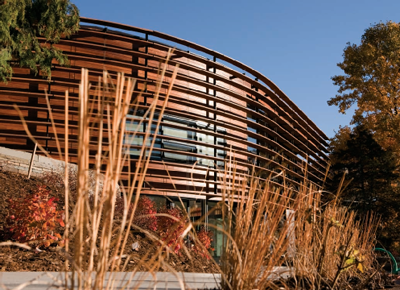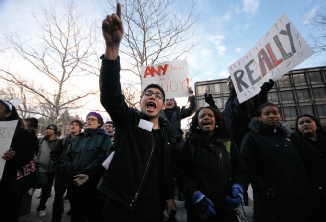In his State of the University address to a packed Statler Auditorium during Trustee-Council Weekend in October, President David Skorton declared his desire to “make a special case for our efforts to bolster the arts and humanities.” Noting that many acknowledge the importance of the humanities in teaching critical thinking to scientists, engineers, and other professionals, he went on to say that “we must also recognize and support the value of the humanities as a discipline of research and critical analysis in its own right and on its own terms. The events and creations of the past cannot change, but our knowledge of them can be enhanced through rigorous study and research.”
The other key theme of his address was the need for recruiting new faculty to replace the many expected to retire over the next decade. “Faculty renewal in the context of academic priorities and substantial retirements is the number one priority in Cornell’s new strategic plan,” Skorton said. “We need to demonstrate our commitment to faculty renewal across the university, taking full advantage of the unique opportunity we have to be the university we want to be—and to get out in front on faculty hiring before many of our peer institutions are in a position to do so.” The effort is being supported by the $100 million Faculty Renewal Fund. Skorton’s address was attended by about 600 members of the Board of Trustees, University Council, and other Cornell constituencies.

Green gateway: The Brian C. Nevin Welcome Center, dedicated in late October, is a visually striking entry to the Cornell Plantations. In addition to offering exhibits and amenities, it was designed to qualify for LEED gold certification. The center is open to the public, with a grand opening ceremony to be held in May . . . when it’s warmer.
Student Killed in Nicaragua
A graduate student in natural resources was stabbed to death in an apparent robbery in Nicaragua in November. Thirty-two-year-old Florida native Ryan Crowder, MPS ’04, was studying sustainable lobster harvests and marketing collectives in a remote part of the country, but was visiting the capital city of Managua when he was killed. Since he carried a gun permit but no firearm was found on his body, its theft was considered a possible motive for the crime.
$80 Million Gift Funds Sustainability Center
Thanks to the largest single gift to the Ithaca campus from an individual, Cornell will have a permanent center for sustainability research. In October, President David Skorton announced that David Atkinson ’60 and his wife, Patricia, had given $80 million to fund the Atkinson Center for a Sustainable Future. Originally established in 2007 as the Cornell Center for a Sustainable Future with $3 million in support from the Atkinsons, the center involves faculty from more than fifty departments in research related to the environment, energy, and economic development.
In other environmental news, Cornell received an A- grade in the Sustainable Endowment Institute’s annual “green report card” rating of colleges and universities. Cornell was one of fifty-three institutions to qualify as an Overall College Sustainability Leader. Two Ivy League universities, Brown and Yale, received an A; Cornell was one of five schools rated A-, while Columbia trailed the pack with a B+.
Far Above Campaign Hits $3 Billion Milestone
Cornell’s capital campaign has passed the $3 billion mark. At an event in Boston in November, campaign co-chairs Jan Rock Zubrow ’77 and Stephen Ashley ’62, MBA ’64, made the announcement to an appreciative throng of alumni and friends. The public phase of the Far Above campaign was launched in October 2006 with an announced goal of raising $4 billion by the end of 2011.
CALS Education Department to Close in Two Years
After what was described as an “extensive review of options,” the CALS administration announced in October that it would close the Department of Education over the next two years. Current students will be allowed to complete their degrees, while faculty and staff will be transferred to other departments. “We are determined to make this transition with as little disruption to programs, faculty, staff, and students as possible,” said CALS dean Kathryn Boor ’80.
After some students reacted angrily to the announcement, CALS senior associate dean Max Pfeffer held two open forums. In what the Daily Sun characterized as “heated exchanges” with students, Pfeffer attempted to explain the financial and educational rationales for the decision. The closing is part of the strategic “reimagining” process at CALS, which has seen the college cut its number of departments from twenty-six to twenty-two over the past year.
Faculty and Students Protest Africana Move

On December 1, Provost Kent Fuchs announced that the Africana Studies and Research Center—which has been, since its 1969 founding, an independent unit reporting to the provost’s office—would be merged with the College of Arts and Sciences, effective July 1. “As with similar changes I have made regarding other programs that previously reported directly to my office,” said Fuchs in a statement, “my goal in making this change is to provide the robust level of academic support that significant programs, such as Africana studies, have a right to expect.”
Protests immediately erupted. Professor Robert Harris resigned his post as the center’s director, and Africana studies professor James Turner stated that “in my forty-one years of service to Cornell, I’ve never seen anything like this.” Two days later, Harris rescinded his resignation at the urging of the Africana faculty, and a group of faculty and students marched to Day Hall. Many objected not only to the move but to the way it was done, saying that the provost had failed to consult with Africana faculty and students before announcing his decision.
Fuchs insisted that the merger was for the best, stating that the Arts college could provide better academic support for the Africana Center and that it would be able to establish a PhD program “that will strongly increase the national prominence of Africana studies and bolster Cornell’s ability to attract superb faculty and students.” As of press time, Harris was continuing to act as the center’s director, but he told the Daily Sun that remaining in that position was “contingent on what understanding I can develop with the provost.”
University Names Two New CIOs
In November, Cornell announced the appointment of a new chief investment officer and the creation of a new administrative position, chief information officer. Michael Abbott is now the chief investment officer, having taken over for James Walsh, who resigned in June. A native of London, Abbott was previously CEO of Robeco-Sage, a hedge-fund group. He will oversee the University’s $4.4 billion endowment and other investments.
The chief information post will be filled by Ted Dodds, currently vice provost at the University of British Columbia. The creation of this VP-level position is part of the University’s effort to coordinate information technology service across the campus. Dodds is scheduled to begin work in mid-January.

On the page: Artist Werner Pfeiffer, who grew up in Nazi Germany, “destroys” books to offer insights into the dangers of censorship. His work is on display in Kroch Library through February in the exhibit “Book-Objects and Artist Books.”
Recent Graduate Commits Suicide in State Park
The barriers installed on bridges on and near campus last spring couldn’t prevent the latest suicide to strike the Cornell community—that of a recent graduate who jumped to her death from a bridge at an area state park in early December. The body of forty-year-old neurobiologist Tine Rubow, PhD ’10, was recovered from a creek in Taughannock Falls State Park, a popular destination with a waterfall and hiking trails located about twenty minutes from campus. Born in Denmark, Rubow grew up in the San Francisco Bay Area and earned an undergraduate degree from Northern Arizona University.
Alumni Elected (or Re-Elected) to U.S. Congress
Seven alumni won or retained congressional seats in the November elections. Re-elected were Rep. Rob Andrews, JD ’82 (D-New Jersey), Rep. Bob Filner ’63, PhD ’73 (D-California), Rep. Gabrielle Giffords, MRP ’97 (D-Arizona), and Rep. Kurt Schrader ’73 (D-Oregon). Newly elected were Hansen Clarke ’84 (D-Michigan), Chris Gibson, MPA ’95, PhD ’98 (R-New York), and Mark Kirk ’81 (R-Illinois), who won Barack Obama’s former senate seat.
Law Student Found Dead in Ithaca Apartment
Second-year law student Daniel Ferrero passed away in his Ithaca home in mid-December. The twenty-six-year-old, who was from Brooklyn, died of natural causes. He is survived by his wife, parents, and two sisters.
Gift Supports Chilean Telescope Project

An $11 million gift from retired businessman Fred Young ’64, MEng ’66, MBA ’66, will help support an ambitious telescope project planned for Chile’s Atacama desert. Set to begin construction in 2013, the Cornell-affiliated Cerro Chajnantor Atacama Telescope would be the largest, most precise astronomical facility in the world; located on a mountain 18,400 feet above sea level, it would also be the highest. Young, a foremost benefactor of the University, is the retired owner and CEO of Young Radiator Co.


